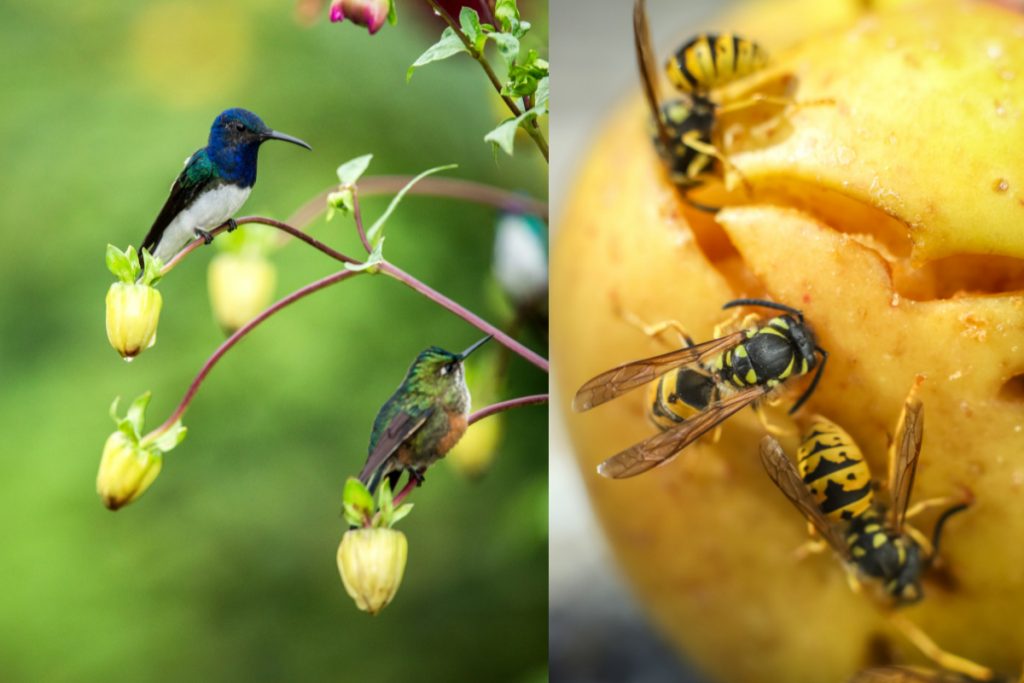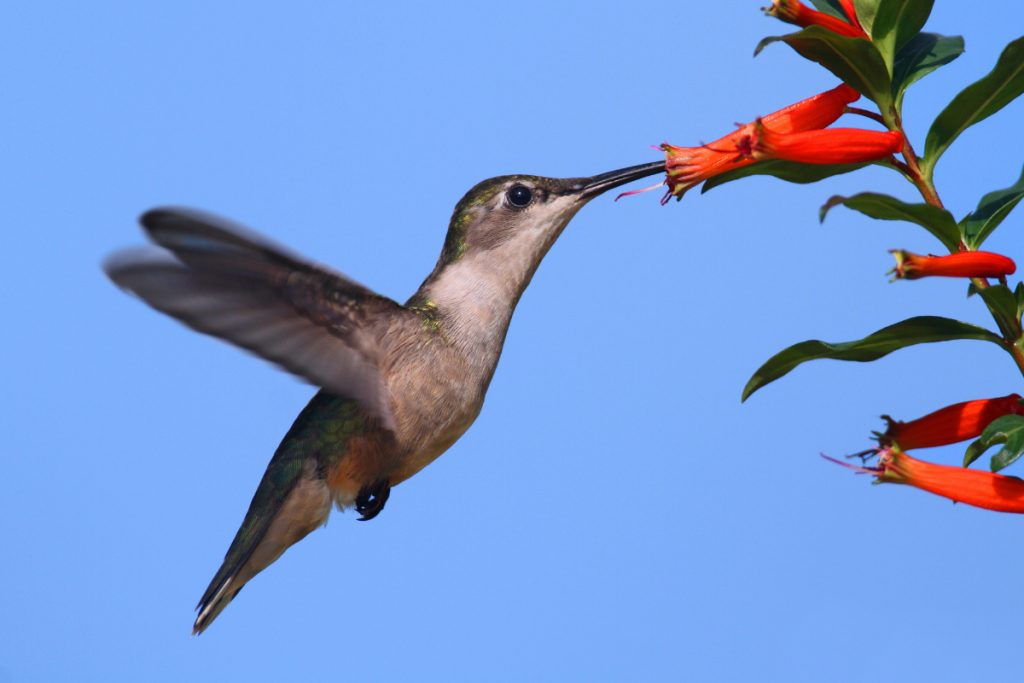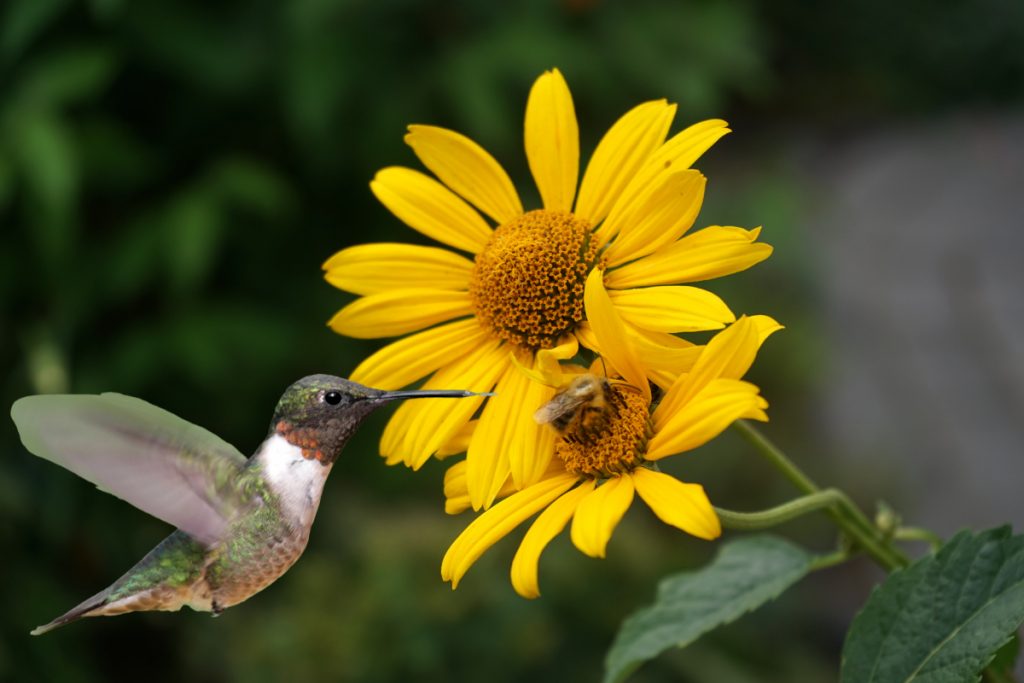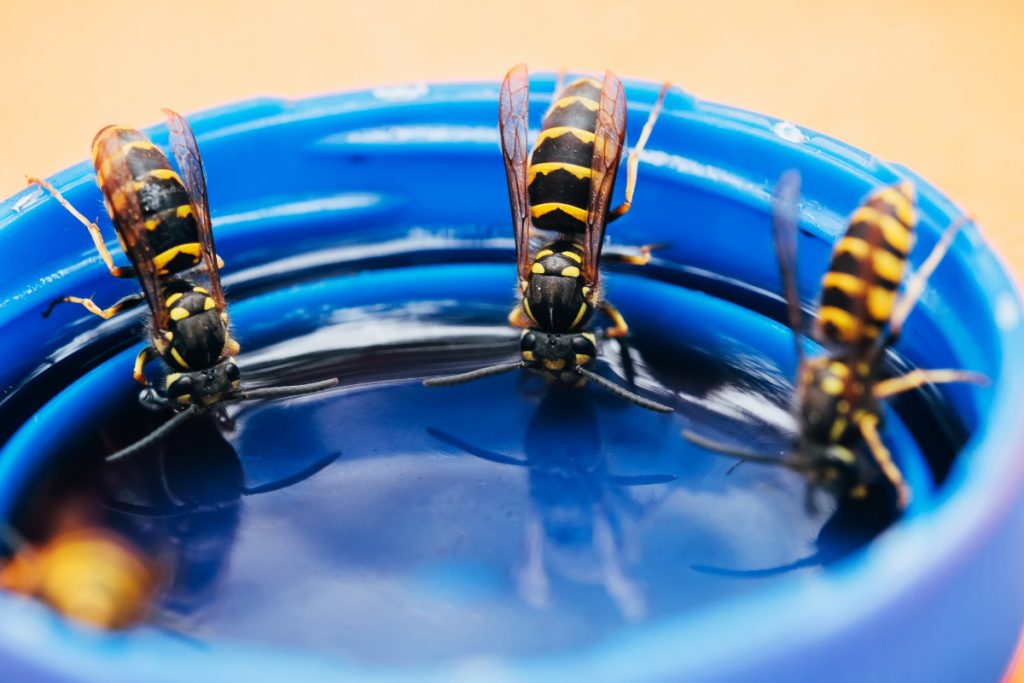Watching hummingbirds hovering around feeders can be pretty fascinating. Unfortunately, this amazement can be short-lived due to uninvited guests like wasps. This made me wonder – do hummingbirds eat wasps if given the chance? It seems like they might do for the protein. But research shows they actually don’t!
In this blog post, we’ll look at the dietary relationship between hummingbirds and wasps. Also, I’ll talk about what hummingbirds really eat instead of wasps.
After reading this article, you’ll better understand if hummingbirds do really eat wasps. So, grab a cup of coffee or your favourite drink, and let’s explore the activities between hummingbirds and wasps!
Key Takeaways on Hummingbirds Eating Wasps
- Hummingbirds primarily feed on nectar and do not consume wasps; instead, they often encounter this insect as competitors for the same nectar sources, leading to occasional interactions in their shared habitats.
- Complex Dynamics: Hummingbirds and wasps have a nuanced relationship, especially around shared nectar resources, influencing their feeding patterns.
- Safety First: Given the potential risks like stings, hummingbirds choose to avoid wasps and instead opt for softer, safer insects for nutrition.
Do Hummingbirds Eat Wasps?
No, hummingbirds do not eat wasps. While they derive energy from flower nectar, their protein source comes from small insects, not wasps. Despite some misconceptions, wasps are not a part of a hummingbird’s diet.
It’s important to understand that hummingbirds prefer safer and more easily digestible insects.

The potential risks associated with predatory insects like wasps, such as stings and tough exoskeletons, make them unsuitable for hummingbirds.
Related post to read about Hummingbird Diet and Nutrition.
Why Do People Think Hummingbirds Eat Wasps?
Here are some reasons for the mistaken idea:
- Wasps share habitat with hummingbirds, making predation seem likely.
- Large hummers like Rufous exhibit predatory behaviour but towards other insect prey.
- Misinterpretation of hummers near nests as raiding rather than unrelated activity.
- Lack of awareness that hummingbirds favour easily digestible insects, excluding wasps.
However, contrary to these beliefs, extensive research reveals that there is no concrete evidence to support the idea that hummingbirds consume wasps.

What Do Hummingbirds Really Eat?
To understand why hummingbirds don’t eat wasps, let’s see what they do eat:
- Little soft bugs like gnats from flowers.
- More bugs when they need extra energy or for babies.
- Tree sap for sugar before flowers open.
- Sometimes, fruit for extra carbs.
- They pick safe foods that are easy to get and have nutrients. Wasps don’t fit.
These preferred foods allow hummingbirds to avoid the risks of trying to eat well-defended insects like wasps.
However, hummingbirds and wasps still intersect in their quest for food. Let’s explore their complex dietary relationship.
Related post to read about Best Hummingbird Feeders.
The Nuanced Dietary Dynamic Between Hummingbirds and Wasps
While hummingbirds do not directly consume wasps, their indirect relationship around food is multifaceted:
- Competition for nectar sources: In environments with limited flowers, hummingbirds and wasps may compete for the same sugary nectar supplies. This is especially evident at hummingbird feeders.
- Predation risks: Hummingbirds do eat small insects, but wasps pose a higher risk than spiders or gnats due to their potential sting. So, wasps are avoided.
- Feeding disruption: Aggressive wasps like yellowjackets can deter hummingbirds from easily approaching feeders and flowers, reducing access to food.
So, although one does not directly consume the other, hummingbirds and wasps intersect around shared nectar resources in ways that can impact the feeding success of both.

Why Don’t Hummingbirds Eat Wasps?
Here’s why wasps don’t work as food:
- Mean adult wasps guard hives and can badly sting hummingbirds.
- Hard wasp shells and stingers are tough to swallow.
- Their poison can make hummingbirds very sick.
- Wasps move fast, making them hard to catch.
- Flowers have lots of safer small bugs to eat instead.
So, generally, wasps are too dangerous for hummingbirds when they can easily find better food is around.
Why Don’t Hummingbirds Simply Feast on Wasps?
While wasps offer some nutritional upside as prey, they also pose substantial risks to tiny hummingbirds who pursue them:
- Painful stings can quickly damage delicate hummingbirds’ bodies.
- Wasps aggressively defend nests, unlike hummingbird-preferred aphids or gnats.
- Crunchy exoskeletons may be difficult to digest compared to soft-bodied larvae.
- Venom, if ingested, contains toxic compounds that can sicken hummers.
- Speedy wasps are harder to snatch from the air compared to slow flies.
- Abundant flower-dwelling insects pose less risk for complete nutrition.
So, while wasps may seem an easy meal, the dangers likely deter all but the boldest hummingbird species and individuals from targeting them.

Final Thought
While hummingbirds do not eat wasps, both hummingbirds and wasps like sweet nectar, so sometimes they meet at the same feeder.
Even if wasps can be a bit scary, hummingbirds are super fast and smart, so they know how to stay safe around wasps.
Isn’t it fascinating how nature finds a way for different creatures to coexist in the same space?
As always, let me know your thoughts on this. I would love to read about your encounters with hummingbirds and wasps!
Useful Links:
Related Posts to Read:
- Do Hummingbirds Beaks Open When Feeding?
- The Mysteries of Hummingbird Flight.
- 6 Fascinating Facts About Hummingbird Sizes.
- Ruby-Throated Hummingbird Migration Map.
- Where Do Hummingbirds Go When It Rains?
- How Much Does A Hummingbird Eat Per Day?
- Do Hummingbirds Eat Bees?
References:
- About Hummingbird (Link).
- Greenewalt, C. H. (1960). Hummingbirds. New York: Doubleday. Google Scholar.
- Carey C. The impacts of climate change on the annual cycles of birds. Philos Trans R Soc Lond B Biol Sci. 2009 Nov 27; 364(1534):3321-30. doi: 10.1098/rstb.2009.0182. PMID: 19833644; PMCID: PMC2781852.
- Rico-Guevara A, Rubega MA, Hurme KJ, Dudley R. Shifting Paradigms in the Mechanics of Nectar Extraction and Hummingbird Bill Morphology. Integr Org Biol. 2019 Jan 2;1(1):oby006. doi: 10.1093/iob/oby006. PMID: 33791513; PMCID: PMC7671138.
- Tyrrell LP, Goller B, Moore BA, Altshuler DL, Fernández-Juricic E. The Orientation of Visual Space from the Perspective of Hummingbirds. Front Neurosci. 2018 Jan 30;12:16. doi: 10.3389/fnins.2018.00016. PMID: 29440985; PMCID: PMC5797624.
- Hummingbirds Sighting (Journey North Map).
- About Hummingbird’s Characteristics.
